Top Conveyor Belt South Africa Manufacturers and Suppliers
In the dynamic landscape of industrial development, the conveyor belt South Africa sector stands as a pivotal component, driving efficiency and productivity across various industries. South Africa, with its extensive mining and manufacturing sectors, relies heavily on conveyor belt systems to transport materials and products efficiently. These conveyor belts are not just vital cogs in the vast machinery of these industries but also symbols of the technological advancement and robust industrial growth in the region. The conveyor belt industry in South Africa has evolved over the years, adapting to the changing needs of different sectors, from mining to food processing. This industry’s growth reflects the country’s economic progress, showcasing innovation in material handling and a commitment to meeting the diverse demands of South Africa’s industrial landscape. As such, conveyor belts play a crucial role in supporting the backbone of the country’s economy, making them indispensable in the realms of mining and manufacturing.
Types of Conveyor Belt South Africa
The conveyor belt South Africa market encompasses a diverse range of belt types, each tailored to meet specific industrial needs. From the robust steel belts used in mining and heavy manufacturing to the versatile PVC and specialized food-grade conveyor belts, South Africa’s industries benefit from a variety of conveyor belt solutions. Below is a table outlining the features and applications of each type:
Each type of conveyor belt in South Africa is designed to cater to specific environmental conditions and operational requirements. Steel cord conveyor belts, for instance, are indispensable in the mining sector due to their strength and durability, capable of handling the rigorous demands of transporting heavy and abrasive materials. PVC conveyor belts, on the other hand, offer a more flexible and cost-effective solution for various manufacturing and packaging processes. They are valued for their adaptability and resistance to a range of chemicals and wear.
In the food processing industry, food-grade conveyor belts are crucial. These belts are specifically designed to meet stringent hygiene and safety standards. They are manufactured from materials that are non-toxic, easy to clean, and resistant to bacterial growth, ensuring that food products are handled in a safe and sanitary manner.
The conveyor belt South Africa market offers a comprehensive range of conveyor belts, each serving distinct purposes across various industries. Understanding the unique features and applications of each type is key to selecting the right conveyor belt for specific industrial needs.
Conveyor Belt South Africa: Technical Specifications
The conveyor belt industry in South Africa offers a diverse range of products tailored to meet various industrial demands. Understanding the technical specifications and features of these belts is crucial for selecting the right product for specific applications.
Variety in Belt Widths
- Belt Widths: Conveyor belts are available in a wide range of widths to accommodate different throughput requirements and operational scales. Typical widths range from 300mm for smaller operations up to 1500mm for large-scale industrial use, covering various needs from compact systems to extensive conveyor networks.
Certifications and Standards
- Local and International Standards: South African conveyor belt manufacturers adhere to various standards to ensure the quality and safety of their products. These include ISO standards for quality management systems and product specifications, as well as local SANS (South African National Standards) that cover different aspects of conveyor belt production and performance.
- ISO 9001: Many manufacturers boast ISO 9001 certification, which ensures that they maintain a consistent quality management system and continually improve their processes.
- SANS Standards: Specific SANS standards, such as SANS 1173 for textile-reinforced belts and SANS 1366 for steel cord-reinforced belts, prescribe the minimum performance requirements for different types of belts. These standards are essential for ensuring that the belts can withstand the operational challenges they are designed for.
The commitment of South African manufacturers to meet and exceed these standards is a testament to their dedication to quality and safety. This not only enhances the reliability of conveyor systems but also ensures compliance with global export requirements, making South African belts competitive internationally.
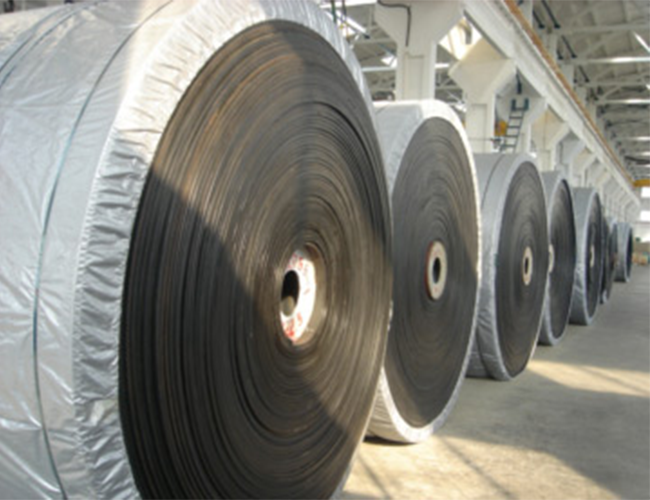
Conveyor Belt South Africa:Products and Innovations
The conveyor belt industry in South Africa is characterized by its innovative approach to meeting the diverse needs of various sectors, including mining, agriculture, and manufacturing. This section delves into the notable products and innovations from leading suppliers in the region.
Specialty and Customized Belting Solutions
- Suppliers like Truco and Fenner Dunlop South Africa emphasize customization to meet specific operational requirements. This includes belts that are tailored in terms of thickness, compound, and reinforcement to handle different types of materials and operational conditions.
- Chevron and Profiled Belts: These are designed for steep incline conveying and are equipped with profiles or cleats to prevent material rollback. They are commonly used in construction and agricultural applications where space is limited and steep angles are necessary.
Innovative Features for Enhanced Performance
- Heat and Fire Resistant Belts: These are crucial in industries where materials at high temperatures are handled, or where belts must pass through areas that could expose them to sparks or flames.
- Oil and Chemical Resistant Belts: Essential in chemical processing or places where oils and other fluids are prevalent, these belts are engineered to resist degradation, thus extending their operational life and ensuring safety.
Technological Advancements
- Smart Conveyor Belts: Some South African companies are integrating sensors and IoT technology into their conveyor systems. These technologies provide real-time data on the performance and health of the conveyor belts, allowing for predictive maintenance and reduced downtime.
- Eco-friendly Belting Options: There is an increasing focus on environmental sustainability, with innovations aimed at producing more eco-friendly materials and reducing the carbon footprint of production and disposal.
Safety and Quality Assurance
- Accreditation and certification from various international and local standards bodies ensure that South African conveyor belts meet high safety and quality benchmarks. This includes compliance with ISO standards and local SANS specifications, which are critical for maintaining high standards of operation and safety.
Collaboration with Industry
- Companies like Fenner Dunlop and Dunlop Belting Products have developed partnerships with mining companies to design and test belts that meet the specific challenges of South Africa’s mining industry, such as highly abrasive materials and the need for fire resistance.
These innovations not only enhance the efficiency and safety of conveyor systems but also position South Africa as a leader in conveyor technology on the global stage. The commitment to innovation reflects the industry’s response to the challenging demands of handling diverse materials under varying operational conditions.
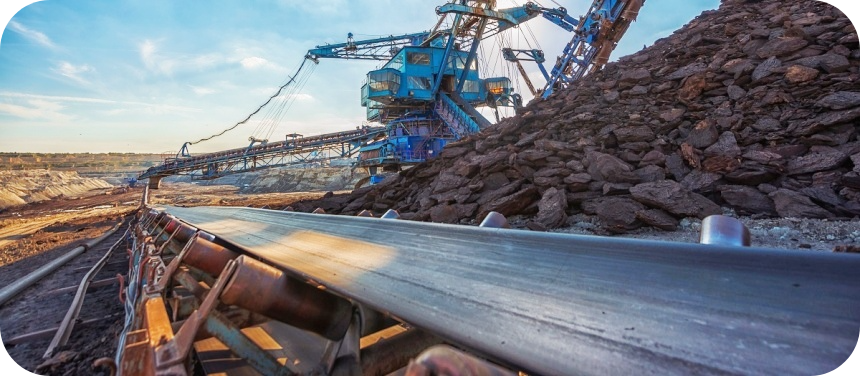
Major Conveyor Belt South Africa Manufacturers and Suppliers
The conveyor belt South Africa industry is bolstered by the presence of several leading manufacturers and suppliers who play a pivotal role in supplying high-quality conveyor solutions to various sectors. Among these, Fenner South Africa and Goodyear stand out as prominent names, each bringing a unique set of products and services to the table.
Tru-Trac: Is a leading manufacturer in the conveyor belt South Africa. Known for their innovative belt tracking solutions, Tru-Trac offers a range of products designed to reduce belt misalignment and improve conveyor efficiency. Their high-quality products are used in various industries including mining, quarrying, and bulk material handling. Tru-Trac’s commitment to quality and customer satisfaction makes them a top choice for conveyor belt solutions in South Africa.
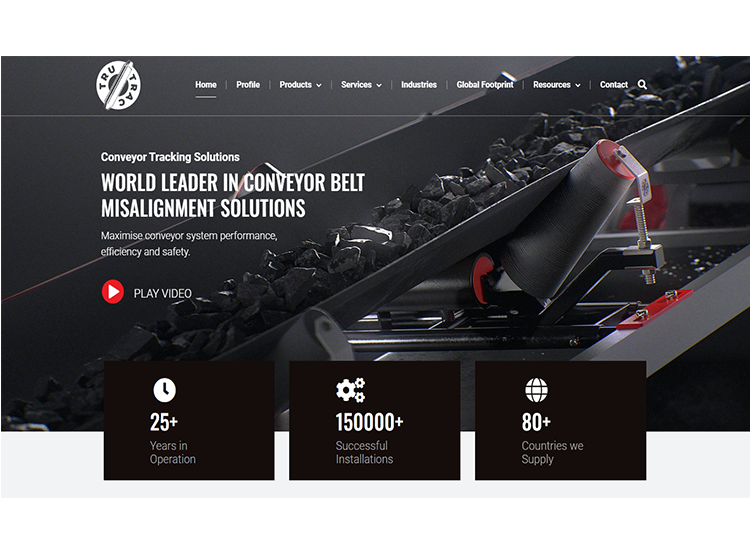
Truco: Is another major player of the conveyor belt South African market. With over 125 years of experience, Truco provides a wide range of rubber products, including high-quality conveyor belts designed to meet the demanding needs of various industries. Their conveyor belts are known for their durability, strength, and performance, making Truco a trusted supplier in the region.
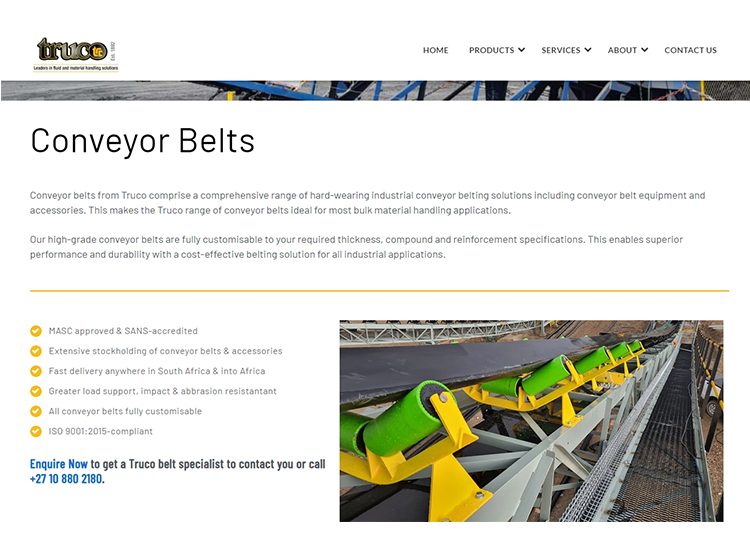
TRC Conveyor Belting (Pty) LTD: Is a well-established supplier of conveyor belts South Africa. They offer a comprehensive range of products tailored to meet the specific needs of their clients. TRC’s focus on quality and reliability ensures that their conveyor belts can withstand harsh operating conditions, making them a preferred choice for many industries.
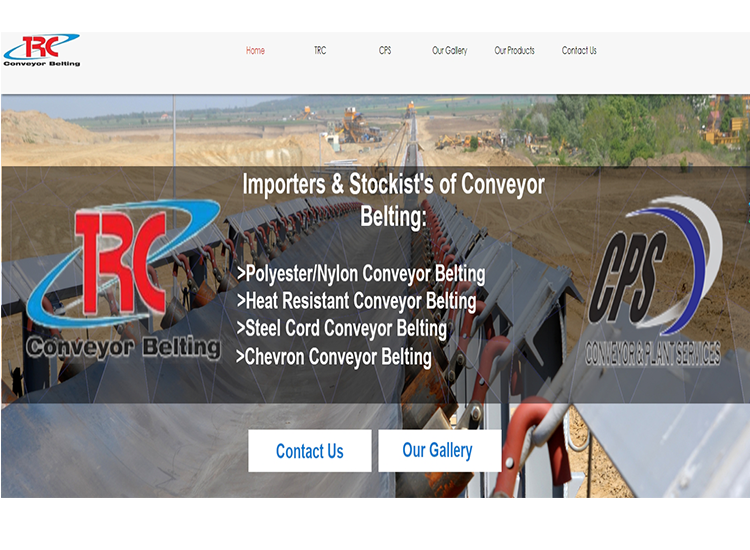
Brelko: Specializes in conveyor belt South Africa cleaning equipment and spillage control solutions. Based in South Africa, Brelko provides high-quality products that help improve conveyor belt performance and reduce maintenance costs. Their extensive product range and commitment to innovation make them a leader in the conveyor belt industry.
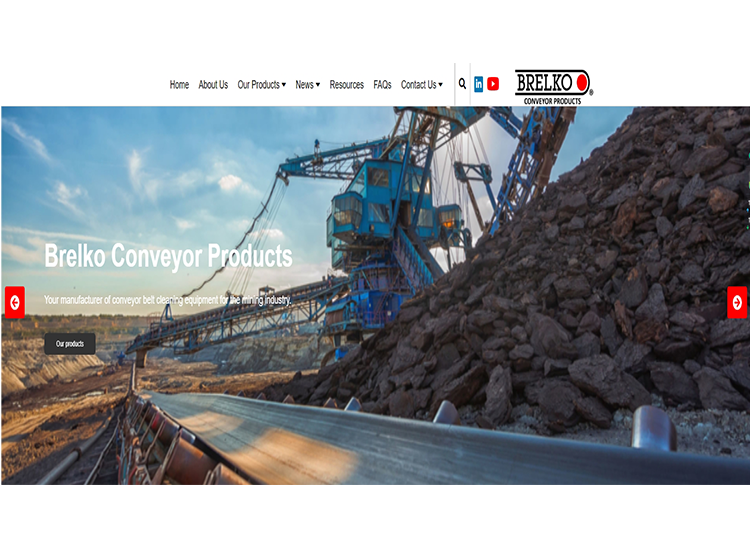
Dunlop Industrial Africa: Is one of the leading manufacturers of conveyor belts South Africa. With a strong focus on quality and innovation, Dunlop provides a wide range of conveyor belts designed to meet the specific needs of different industries. Their products are known for their durability, reliability, and performance, making Dunlop a trusted name in the conveyor belt market.
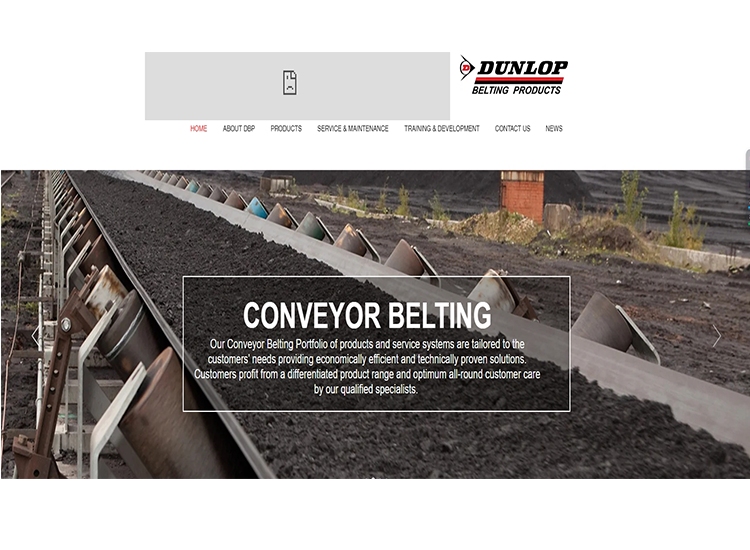
Fenner South Africa: Fenner is renowned for its comprehensive range of conveyor belts that cater to diverse industrial needs. Known for their innovation and quality, Fenner’s products are widely used in mining, manufacturing, and other heavy-duty applications. They offer a variety of conveyor belts, including heat-resistant, flame-retardant, and abrasion-resistant options. Fenner South Africa’s commitment to technological advancement and customer service has made them a preferred choice in the South African market.
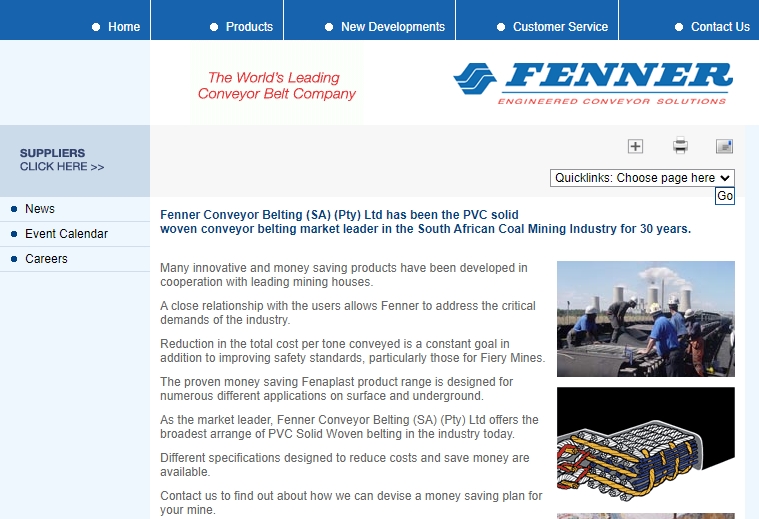
Goodyear: Another major player in the conveyor belt South Africa market, Goodyear, is recognized for its durable and efficient conveyor belts. Their products are designed to withstand the harsh conditions of mining and industrial environments. Goodyear’s belts are known for their reliability and longevity, making them a go-to option for businesses looking for long-term conveyor solutions.
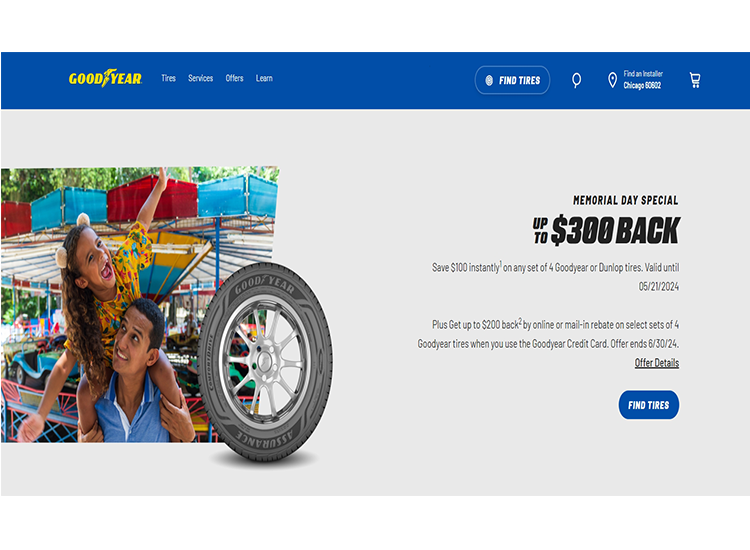
Melco Conveyor Equipment: Melco is a leader in the manufacturing of conveyor equipment, offering a comprehensive range of conveyor components that meet international quality standards. Their extensive product range and commitment to quality and innovation make them a key player in the industry.
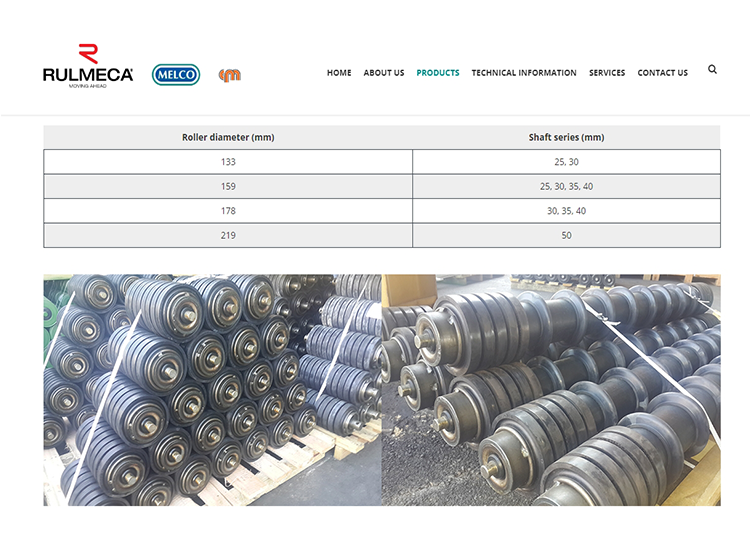
Dunlop Belting Products: As South Africa’s only 100% locally manufactured supplier of Conveyor Belts and Industrial Hose, Dunlop Belting Products stands out for its commitment to local production and high-quality products. Their offerings are tailored to meet the diverse needs of their customers, providing economically efficient and technically proven solutions.
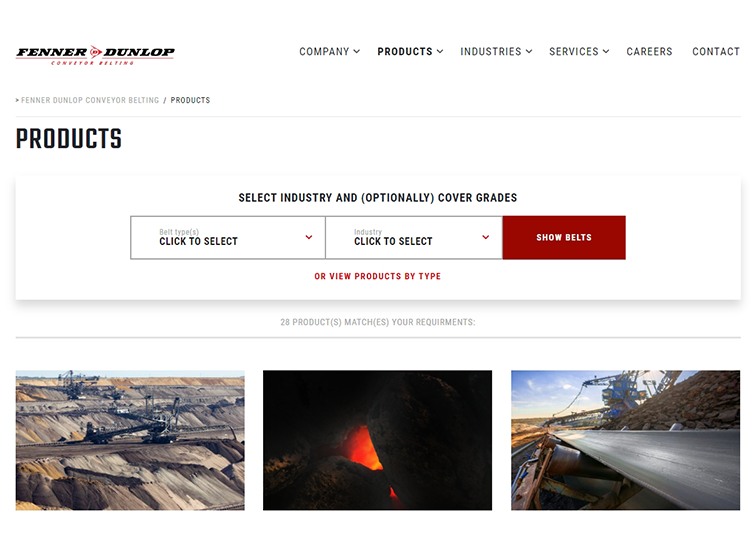
CIS Conveyor Systems JHB: This supplier offers a wide range of conveyor belting and components, adhering to all national and international standards. Their product lineup includes plied rubber conveyors, heat-resistant belts, flame retardant, high abrasive covers, and more, ensuring a solution for various industry needs.
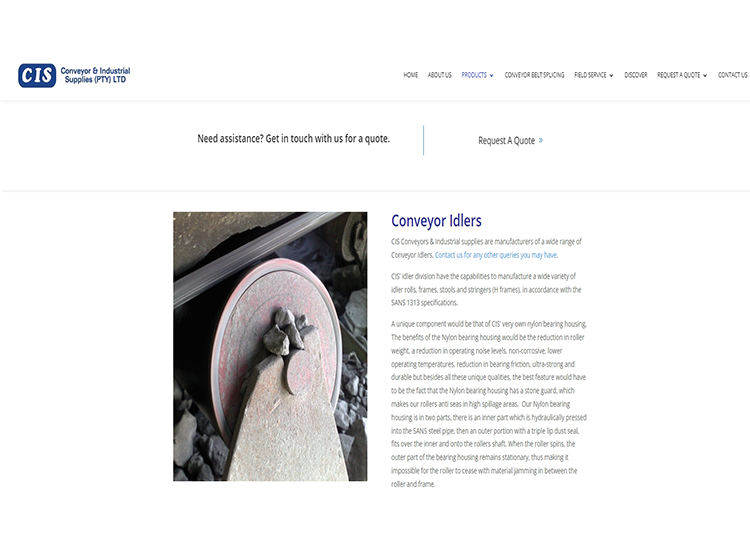
Convey Systems: Known for their durable and rugged conveyor belts, Convey Systems focuses on designing and manufacturing state-of-the-art conveyor belts and systems. They offer tailored solutions to meet specific customer needs, ensuring their operations are efficient and forward-moving.
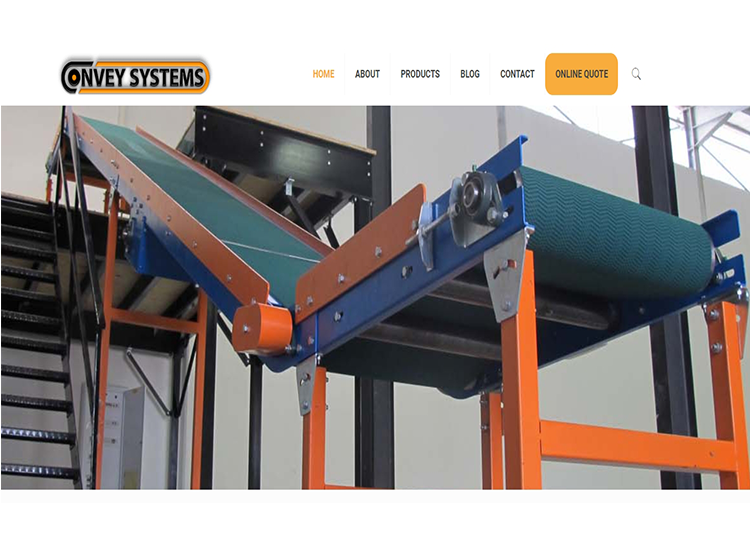
In addition to these global giants, the South African market is also supported by numerous local suppliers, particularly in industrial hubs like Johannesburg. These local suppliers offer a range of conveyor belt products, from standard belts to customized solutions, catering to the specific needs of businesses in the region. They are known for their flexibility, quick delivery times, and ability to provide personalized services, which are crucial for small to medium-sized enterprises.
The presence of these major manufacturers and local suppliers ensures that the conveyor belts South Africa market remains dynamic and capable of meeting the diverse requirements of its industrial sectors. With a blend of global expertise and local understanding, these companies contribute significantly to the growth and efficiency of South Africa’s industrial landscape.
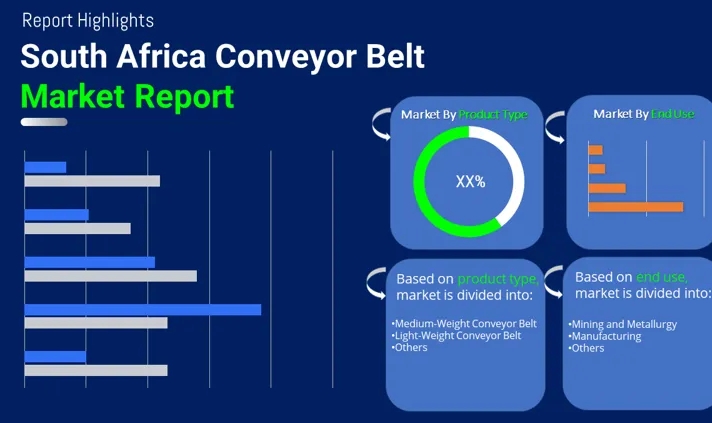
How to Select the Right Conveyor Belt Supplier in South Africa
Selecting the right conveyor belt supplier is crucial for ensuring efficient, safe, and cost-effective operations. Here are key considerations and why they matter:
Comprehensive Product Range
- Why It Matters: A supplier with a broad product range can cater to diverse industrial needs, ensuring you find the exact type of conveyor belt required for your specific application—be it mining, agriculture, or manufacturing.
- What to Look For: Check if the supplier offers a variety of belt types, such as textile-reinforced, steel cord, and PVC belts, as well as specialty belts that may be necessary for more demanding or unique applications.
Customization Options
- Why It Matters: Each operation may have unique requirements based on the material being transported, the environment, and operational speeds. Customization ensures the conveyor belt meets these specific needs.
- What to Look For: Suppliers should provide options to customize belt width, thickness, and compound materials. Also, look for services like on-site belt splicing or modifications to fit specific conveyors.
Reliable Delivery Times
- Why It Matters: Delayed delivery can significantly disrupt operations, especially in industries where downtime affects productivity directly.
- What to Look For: Evaluate the supplier’s track record for on-time delivery. Reliable suppliers will have systems in place to ensure that products are delivered as agreed.
After-sales Service
- Why It Matters: The relationship with your supplier shouldn’t end at purchase. After-sales support is crucial for addressing any post-installation issues that might arise.
- What to Look For: Look for suppliers who offer comprehensive after-sales services, including technical support, maintenance, and repair services. This can greatly enhance the lifespan and performance of your conveyor belts.
Local Support and Stock Availability
- Why It Matters: Suppliers with strong local presence can offer quicker service and are more accessible for urgent needs or emergencies. Additionally, local stock availability minimizes the risk of operational downtime due to waiting on parts or replacements.
- What to Look For: Prefer suppliers with local warehouses or distribution centers. This not only ensures faster delivery but also indicates that the supplier maintains an inventory that can promptly meet client demands.
Reputation and Industry Experience
- Why It Matters: Experience and reputation are indicators of a supplier’s ability to deliver high-quality products and handle complex challenges.
- What to Look For: Research their past projects, read customer testimonials, and check their involvement in significant industry applications. Established suppliers will often have documented case studies or references.
By carefully evaluating these factors, you can choose a conveyor belt supplier in South Africa that not only meets your immediate product needs but also supports your ongoing operational requirements effectively.
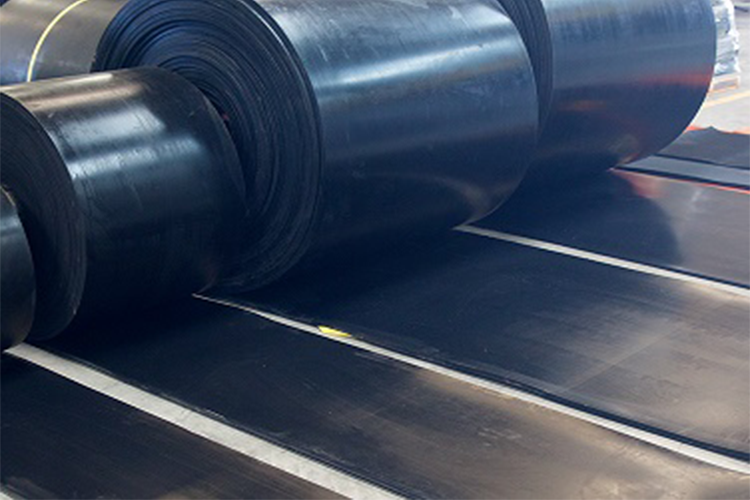
Cost and Availability of Conveyor Belt South Africa
The conveyor belt South Africa market is influenced by various cost factors that impact the pricing and availability of these essential industrial components. Understanding these factors is crucial for businesses looking to invest in conveyor belt systems. Here are five key points that affect the cost of conveyor belts in South Africa:
Material and Quality: The type of material used in manufacturing conveyor belts significantly influences their cost. High-quality materials like reinforced rubber or specialized fabrics for enhanced durability and performance typically come at a higher price. The choice between standard PVC belts and more advanced materials like steel-corded belts also affects the cost.
Size and Customization: The size of the conveyor belt and any custom features required for specific industrial applications can impact the cost. Larger belts with custom dimensions or specialized properties (such as heat resistance or high tensile strength) will generally be more expensive.
Technological Advancements: Conveyor belts incorporating advanced technologies, such as integrated sensors for monitoring wear and tear or automated tensioning systems, can be more costly than standard belts. However, these features can offer long-term savings through improved efficiency and reduced maintenance costs.
Supply and Demand Dynamics: The availability of conveyor belts in South Africa is subject to market demand and supply chain factors. High demand in key industries like mining and manufacturing can drive up prices, especially for specialized belt types.
Import Costs and Local Manufacturing: South Africa imports a significant portion of its conveyor belts, which can be subject to fluctuating exchange rates and import duties. Locally manufactured belts might offer cost advantages but are dependent on the availability of raw materials and manufacturing capabilities.
For businesses looking to purchase conveyor belts, a variety of suppliers can be found throughout South Africa, particularly in industrial hubs like Johannesburg and Cape Town. Many suppliers have online platforms where businesses can browse available products, compare prices, and request quotes. Additionally, local trade shows and industry events can be valuable resources for connecting with suppliers and manufacturers. For more personalized service or specific product inquiries, reaching out to suppliers directly via phone or email is recommended. Many suppliers also offer the option of visiting their facilities to view products firsthand and discuss specific requirements.
Secure your success with our premium conveyor belts – don’t wait!
Used Conveyor Belt South Africa and Their Viability
The market for used conveyor belt South Africa offers a cost-effective alternative to new conveyor belt systems, particularly for businesses looking to optimize their operations within a budget. Understanding the viability of these used conveyor belts involves assessing their quality, durability, and overall cost-effectiveness.
Market for Used Conveyor Belts: In South Africa, the market for used conveyor belts is primarily driven by industries looking to reduce expenses without compromising on efficiency. These belts often come from sectors like mining or manufacturing, where conveyor systems are regularly updated, leaving used belts that are still functional. Suppliers of used conveyor belts are commonly found in industrial areas, and many operate online platforms to widen their reach.
Quality Assessment: The quality of a used conveyor belt is paramount. Prospective buyers should thoroughly inspect the belt for any signs of excessive wear, tears, or damage. It’s crucial to understand the belt’s history, including its previous application and duration of use. Some suppliers offer certified pre-owned conveyor belts that have been rigorously tested and refurbished, providing a level of assurance regarding their condition.
Durability Considerations: Durability is a key factor in assessing the viability of a used conveyor belt. The expected lifespan of the belt depends on factors like the material quality, the intensity of its previous use, and maintenance history. Buyers should seek belts made of durable materials that can withstand their specific operational demands.
Cost-Effectiveness: One of the main advantages of opting for a used conveyor belt in South Africa is the potential cost savings. Used belts are significantly cheaper than new ones, making them an attractive option for smaller operations or those with limited budgets. However, it’s important to balance the initial savings against potential future maintenance costs. A thorough cost-benefit analysis should be conducted to ensure that the used belt offers value over its remaining lifespan.
The used conveyor belt South Africa market presents opportunities for cost savings and operational efficiency. However, careful consideration of the quality, durability, and overall cost-effectiveness of these belts is essential to make a viable and economical choice. Buyers should conduct thorough research, seek reputable suppliers, and consider the specific requirements of their conveyor systems before making a purchase.
Conveyor Belt South Africa Solutions for the Mining Industry
In the conveyor belt South Africa sector, the mining industry stands out as a primary user of conveyor belt systems. These belts are specifically tailored to meet the rigorous demands of mining operations, both in terms of functionality and durability. Here, we explore six key features of mining conveyor belts and highlight some of the key manufacturers in South Africa.
High Tensile Strength: Mining conveyor belts must have high tensile strength to handle the heavy loads of mining materials. They are designed to carry large quantities of materials like coal, ore, and minerals without stretching or breaking.
Abrasion Resistance: Given the abrasive nature of mined materials, these conveyor belts are manufactured with high abrasion-resistant materials to withstand constant wear and tear, thereby extending their lifespan.
Heat and Fire Resistance: Mining environments can be extremely hot and may pose fire hazards. Conveyor belts used in such settings are often heat and fire-resistant to prevent melting or catching fire, ensuring safety in the workplace.
Chemical Resistance: Exposure to chemicals and corrosive materials is common in mining. Conveyor belts in this industry are often treated or manufactured with materials that can resist these harsh chemicals.
Energy Efficiency: With the growing focus on sustainability, mining conveyor belts are increasingly designed to be energy-efficient, reducing the overall operational costs and environmental impact.
Customization and Adaptability: Mining operations vary greatly, and so do their conveyor belt needs. Manufacturers in South Africa offer customized solutions to fit specific mining requirements, ensuring optimal efficiency and productivity.
Key manufacturers in South Africa that specialize in mining conveyor belts include companies like Fenner South Africa and Goodyear, among others. These manufacturers are known for their quality, innovation, and ability to provide conveyor belt solutions that meet the unique challenges of the South African mining industry. They offer a range of products and services, from the supply of new belts to maintenance and repair services, ensuring that mining operations run smoothly and efficiently.
Food-Grade Conveyor Belt South Africa and Safety Standards
In the conveyor belt South Africa market, food-grade conveyor belts represent a critical segment, especially in the food processing and packaging industries. These belts are designed to meet stringent safety standards and ensure compliance with health regulations. Here are five key points highlighting the importance of food-grade conveyor belts, along with a discussion on the safety standards and compliance in South Africa.
Hygiene and Health Compliance: Food-grade conveyor belts are manufactured to comply with strict hygiene standards. They are made from materials that are non-toxic, easy to clean, and resistant to bacterial growth, ensuring that food products are not contaminated during processing and handling.
Resistance to Contamination: These belts are designed to resist absorption of oils, fats, and food particles, which helps in preventing cross-contamination between different food products. This is crucial for maintaining the quality and safety of food items.
Durability in Various Environments: Food-grade conveyor belts in South Africa are designed to withstand the diverse conditions of food processing, including exposure to high temperatures, moisture, and various cleaning chemicals, without degrading.
Compliance with International Standards: In South Africa, food-grade conveyor belts must adhere to international safety standards such as the FDA (Food and Drug Administration) and EU regulations. This compliance ensures that the belts are safe for food contact and suitable for export markets.
Customization for Specific Food Industries: These conveyor belts are tailored to meet the specific needs of various food industries, such as dairy, meat, bakery, and seafood processing. Customization includes selecting the right belt material, texture, and design to handle different food products effectively.
Safety standards for food-grade conveyor belts in South Africa involve rigorous conveyor belt testing and certification processes to ensure they meet the required health and safety guidelines. Manufacturers and suppliers must ensure that their products are free from harmful substances and are capable of being effectively cleaned and sanitized. Regular audits and inspections are conducted to maintain these standards. Compliance with these safety standards is not just a regulatory requirement but also a commitment to consumer health and safety. As the food industry continues to grow and evolve in South Africa, the demand for high-quality, safe, and compliant food-grade conveyor belts is expected to rise, driving innovation and higher standards in the conveyor belt South Africa market.
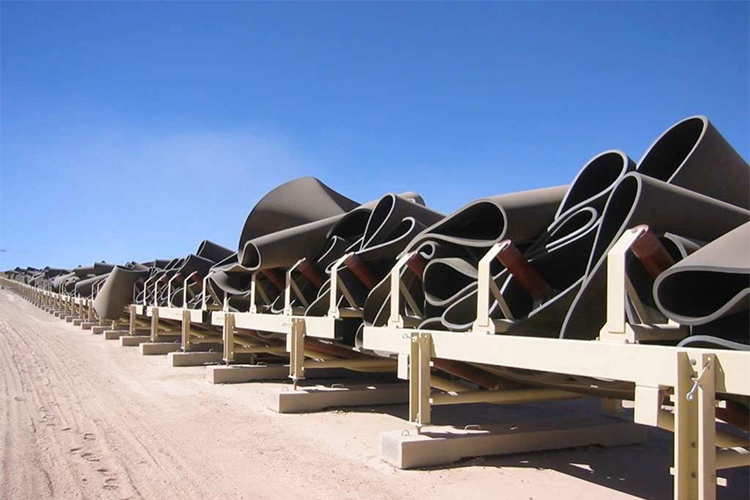
Technological Advancements in Conveyor Belt South Africa
The conveyor belt South Africa industry is witnessing a significant transformation driven by technological advancements in conveyor belt design and materials. These developments are not only enhancing the efficiency and functionality of conveyor systems but also paving the way for more sustainable and cost-effective solutions. Here, we explore some of the key advancements and the future outlook of conveyor belt technology in South Africa.
Smart Conveyor Belts: One of the most notable advancements is the integration of smart technology into conveyor belts. These smart belts are equipped with sensors and IoT (Internet of Things) capabilities, allowing for real-time monitoring of belt health, including wear and tear, speed, and alignment. This technology enables predictive maintenance, reducing downtime and extending the lifespan of the conveyor system.
Eco-friendly Materials: There is a growing trend towards the use of eco-friendly materials in conveyor belt construction. Manufacturers are exploring alternatives to traditional materials, focusing on reducing carbon footprint and enhancing recyclability. This shift is in response to the increasing environmental awareness and the push for sustainable industrial practices.
High-Performance Composites: The use of high-performance composite materials is another significant advancement. These materials offer superior strength, durability, and resistance to extreme temperatures and corrosive substances. They are particularly beneficial in harsh industrial environments, such as mining and chemical processing.
Energy-Efficient Designs: Energy efficiency is a critical focus area, with new designs aiming to reduce power consumption of conveyor systems. Innovations include optimized belt structures and automated control systems that adjust belt speed based on load, thereby conserving energy.
Enhanced Safety Features: Advancements in safety features are also prominent, with the development of belts that incorporate fire-resistant and anti-static properties. These features are crucial in industries where there is a risk of fire or explosion.
The future outlook of conveyor belts South Africa technology is promising, with a focus on innovation that meets the demands of various industries while addressing environmental concerns. The market is expected to continue evolving, with an emphasis on smart technologies, sustainability, and enhanced safety. As South Africa continues to grow as an industrial hub, these technological advancements in conveyor belts will play a vital role in supporting the efficiency and growth of its various sectors.
FAQs about Conveyor Belt South Africa
Continental AG, based in Germany, is one of the largest and leading developers and manufacturers of innovative conveyor belt technology globally. They deliver comprehensive services for conveyor belts and systems across various industries, including mining and mechanical engineering (Plant Automation Technology).
Top conveyor belt companies globally include:
Continental AG: Known for its comprehensive range of conveyor belt technologies.
Bando Chemical Industries, Ltd.: A leading Japanese company with a wide range of products including high-performance conveyor belts.
Intralox: Specializes in innovative conveying solutions, particularly in the food processing and e-commerce sectors.
Fenner PLC: Focuses on reinforced polymer technology with a significant presence in conveyor belts.
Volta Belting Technology Ltd.: Offers advanced belting solutions across multiple industries (IMARC) (Expert Market Research) (Plant Automation Technology).
The three main types of conveyor belts used across various industries are:
Flat Belt Conveyors: These are the most common type, used primarily for moving items along a straight path or between different levels.
Modular Belt Conveyors: Composed of interlocking pieces, they are adaptable for transporting items through curves, inclines, or declines.
Cleated Belt Conveyors: These have vertical cleats to help prevent items from sliding in inclined or vertical setups.
The longest conveyor belt on Earth is the Western Sahara Conveyor Belt. This system transports phosphate from the mines in Bou Craa in Western Sahara to the coast. It extends over 61 miles (98 kilometers) and plays a crucial role in agricultural applications worldwide.
Last Updated on August 9, 2024 by Jordan Smith
Jordan Smith, a seasoned professional with over 20 years of experience in the conveyor system industry. Jordan’s expertise lies in providing comprehensive solutions for conveyor rollers, belts, and accessories, catering to a wide range of industrial needs. From initial design and configuration to installation and meticulous troubleshooting, Jordan is adept at handling all aspects of conveyor system management. Whether you’re looking to upgrade your production line with efficient conveyor belts, require custom conveyor rollers for specific operations, or need expert advice on selecting the right conveyor accessories for your facility, Jordan is your reliable consultant. For any inquiries or assistance with conveyor system optimization, Jordan is available to share his wealth of knowledge and experience. Feel free to reach out at any time for professional guidance on all matters related to conveyor rollers, belts, and accessories.



